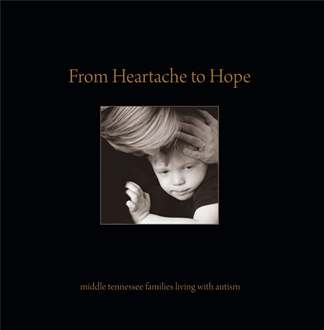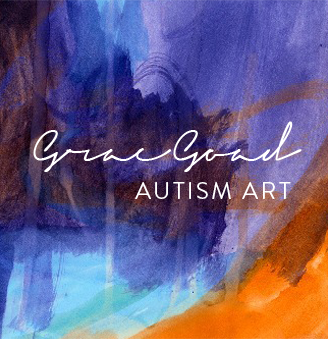Oops! The cat was out of the bag. In personal meeting a year ago, a usually ultra buttoned lipped Vanderbilt Kennedy Center staffer let it slip: Blythe Corbett may be coming to Nashville. All I knew about this former UCLA pediatric neuropsychology professor was that she had an interest in the relationship between arts and disAbilities, had purchased some GraceArt cards and was interviewed for Public Radio International's Studio 360 about the connection between art and autism, which I featured here, and that she was special.
Now the Doctor is in and she's making her Nashville debut Tuesday, March 8 at 7 p.m. at the Blair School of Music in Turner Recital Hall. All proceeds of the benefit will fund camp scholarships for SENSE Theatre–a unique theatrical intervention research program designed to improve the social and emotional functioning of children with autism and related neurodevelopmental disorders. This innovative program pairs young actors without disabilities, who are experts in social communication and language, with children with autism who have challenges with basic social interactions. SENSE Theatre is scheduled for two weeks, three hours per day, in June 2011. It will be held in collaboration with the Vanderbilt Kennedy Center and the University School of Nashville Theatre Guild students and Theatre Department.
Before Corbett became a professor of pediatric neuropsychology, she was an actress and writer in Los Angeles. Back to school, many years and a Ph.D. later, she's spent years studying autism and the last two combining her love for theater, writing and passion for children on the autism spectrum. While SENSE Theatre will premiere in Nashville as a two-week camp, Corbett aims to replicate her successful L.A. model and offer a theatrical production per quarter.
Please consider supporting this new project by attending the March 8 fundraiser or making a donation. (I did!) At the $50-ticket event, Franc D’Ambrosio, the world’s longest running Phantom of the Opera will headline an evening of performances. Others performing include: Michael Valcour, a former SENSE Theater participant; Tammy Vice, Nashville singer songwriter and parent autism advocate, "The Least of Your Worries," Nashville Battle of the Band winning trio and the University School of Nashville Theatre Guild Members.
In addition to this creative offering for disAbility community members who often find arts opportunities inaccessible, Corbett has published her research findings in prestigious scientific journals. Proving her hypothesis, youth with autism (ages 7 to 18) broke through barriers of social communication through the performing arts they learned while in the project, plus the video and peer modeling portions of the project.
"SENSE Theater is a rich opportunity to create a visionary and imaginative community-based intervention program," says Corbett, founder of SENSE Theatre and assistant professor of Psychiatry at Vanderbilt University. "Theatre aids in enhancing communication and relating to one another. The theatre can be transforming for many people-especially for children with autism."





I know you know that I can’t diagnose or treat plpoee here in the blogosphere. In fact, I’ve taken myself out of pediatric practice because of my illness. Of course I can’t help thinking about medical stuff and having my own private thoughts about it, but my public practice has been shut down for ten years.The main thing is not so much pinning down a DSM diagnosis with kids. It’s paying proper attention to their needs. If you haven’t had him evaluated by a university based multidisciplinary clinic, do so. They look at things like spacial integration, balance and coordination, visual fields, audiology, all these sensory-motor factors that make such a huge difference in whether a kid feels like they’re really here or not. A kid with sensory-motor integration problems might have screaming fits just because they have sensations that don’t make any sense to them, and it freaks them out. Think of Temple Grandin’s squeeze machine (if you haven’t read Thinking in Pictures, you should). In my university’s program for autistic spectrum kids, they had a brilliant therapist who would catch a kid before he spun out of control and roll him up in a yoga mat type thing. The kid felt safe, enclosed, and his squeeze receptors got squeezed, and he calmed down. Now tell me why these kids don’t like to be hugged, but they love to be rolled up in a rug??? I can’t tell you how many hours I spent bear-hugging my son when he was very young while he raged, screamed, kicked, tried to bite, head-butted, and fought like the devil. When he calmed down I would carry him to his room and set him on his bed, telling him he could come out of his room when he felt human. Then he would tear apart his room, throwing every single thing on the floor. I had a blow-up clown that he could pummel, and he did. Then, after the storm had passed, it would get very quiet in his room. I’d hear the door open. Mama? I’m human now. Can I come out? And I’d go and help him put his room back together, and we’d go do something completely different like make lunch or go for a walk. This happened about three times a week. Now he’s a doctoral student in Medicinal Chemistry. You just have to hang in there with them and try to get them what they need, and never give up being their advocate. And love them. A lot.